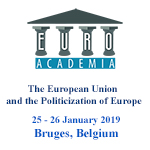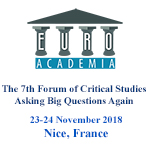Euroacademia Conferences
 Europe Inside-Out: Europe and Europeanness Exposed to Plural Observers (9th Edition) April 24 - 25, 2020
Europe Inside-Out: Europe and Europeanness Exposed to Plural Observers (9th Edition) April 24 - 25, 2020 Identities and Identifications: Politicized Uses of Collective Identities (9th Edition) June 12 - 13, 2020
Identities and Identifications: Politicized Uses of Collective Identities (9th Edition) June 12 - 13, 2020 8th Forum of Critical Studies: Asking Big Questions Again January 24 - 25, 2020
8th Forum of Critical Studies: Asking Big Questions Again January 24 - 25, 2020 Re-Inventing Eastern Europe (7th Edition) December 13 - 14, 2019
Re-Inventing Eastern Europe (7th Edition) December 13 - 14, 2019 The European Union and the Politicization of Europe (8th Edition) October 25 - 26, 2019
The European Union and the Politicization of Europe (8th Edition) October 25 - 26, 2019 Identities and Identifications: Politicized Uses of Collective Identities (8th Edition) June 28 - 29, 2019
Identities and Identifications: Politicized Uses of Collective Identities (8th Edition) June 28 - 29, 2019 The European Union and the Politicization of Europe (7th Edition) January 25 - 26, 2019
The European Union and the Politicization of Europe (7th Edition) January 25 - 26, 2019 7th Forum of Critical Studies: Asking Big Questions Again November 23 - 24, 2018
7th Forum of Critical Studies: Asking Big Questions Again November 23 - 24, 2018 Europe Inside-Out: Europe and Europeanness Exposed to Plural Observers (8th Edition) September 28 - 30, 2018
Europe Inside-Out: Europe and Europeanness Exposed to Plural Observers (8th Edition) September 28 - 30, 2018 Identities and Identifications: Politicized Uses of Collective Identities (7th Edition) June 14 - 15, 2018
Identities and Identifications: Politicized Uses of Collective Identities (7th Edition) June 14 - 15, 2018
Papers
Left Problems, Nationalism and the Crisis
In spite of the rise of Jeremy Corbyn’s Labour party, emboldened nationalism remains at the centre of British politics. After all, much of the past decade had seen nationalism become the most reliable broker of electoral power. It had informed the rise of far-right populisms whilst also fortifying centre-right rule. These nationalisms manifest along multiple registers. Our talk will provide a historically attuned analysis of the relationship in Britain between the current crisis and xeno-racist nationalism, including an engagement with the myths surrounding whiteness and the working class. It is our wider argument that this repudiation can only manifest through a solid understanding of the contemporary crisis in which these nationalisms arise.Europe and the Politics of Convergence: Autonomy and Heteronomy in the European Social Imaginary
This paper argues that the EU’s overenchantment with the achievements of integrations and persistence in limited democratic politics with functional hierarchies and club-based priorities, facilitates the re-instalment of a heteronomous divergence of national opportunist politics, re-emergence of old uncritical visions and social fears. Europe still needs to foster its own imaginary social significations as autonomy understood in the sense of Cornelius Castoriadis to be an unlimited critical questioning of existing norms and values in order to facilitate an authentic deliberative sphere and the formation of new European imaginary significations that go beyond old national(ist) habits.The Construction and Transition of the American Transnational Corporations Discursive Power in the Sino-US Foreign Relations-Past, Present and Future
this paper aims to explore the American transnational corporations’ influence towards the government, the media and the public from the perspective of Discursive Power to explore how they set up and implement the effective dialogues with the target audience in order to execute their power of influencing policies during certain historical stages, and further to track the changes after Trump’s anti-globalization standpoint and changing policies towards China. The study will combine qualitative study with quantitative research by analyzing five dimensions of discursive power: discourse subject, audience, content, platform and effects. The research time frame will be from 1998 to 2017, under four American administrations, by applying historical and comparative methodology to compare the changes of these five dimensions.The Sources of a Modern Idea of United Europe
Rationalism in the political theory of Leibniz manifest itself primarily in that everything is applied to an abstract political reality, and humanity‘s diversity is treated merely as a superficial phenomenon. Until rationalism it was thought that humanity‘s diversity (its cultures and ways of life) – determine the differences in political organization of the communities. For Leibniz, all that diversity can be abolished. Herein lays the basic premise of the idea of an everlasting peace: the differences are the cause of conflicts. Because of this, the modern project of Europe is a project of humanity‘s unification. The projects of everlasting peace, proposed in 18th century and approved by Leibniz, were also a means of abolishing the natural diversity of peoples and nations that was characteristic to Western Christendom.The Relation between Cultural Tourism and Traditional Churches Art in Romania’s Country Sites
This paper focuses on the relation between cultural tourism and traditional churches art in Romania’s rural sites while investigating the foreign tourists perceptions about local customs and traditions in identity making practices. As tourism facilitates the interaction of the locals with foreign tourists, it creates also an energy of exchange and enriches cultures on both sides. UNESCO World Heritage in Romania includes now six cultural sites : Dacian fortresses in the Orăştie Mountains, Transylvanian fortified churches, churches of Moldavia, Horezu Monastery, the wooden churches of Maramureş and the historical center of Sighisoara. The Horezu Monastery represents a masterpiece of the Brâncovenesc style.‘Tell All The Truth But Tell It Slant’: Recovering Angela Davis’ presence in Robert Barry’s Marcuse Piece
Recovering Davis’s presence brings to the fore political contexts such as the Black liberation and prison abolition movements that have been ignored in traditional histories of Conceptual art because their very objects–the artists and their works¬–were themselves oblivious to these contexts. This paper proposes unexpected sites of resistance in Barry’s Marcuse Piece, which allow us to rethink the meaning and the history of Conceptual Art in the United States.Critical Analysis of National Stereotypes in Popular Culture: Narrative of ‘Evil Hungarians’ in the Czech Historical Discourse
Accepting Renan’s thesis about 'collective forgetting' as well as Schmitt’s concept of symbolical antagonistic identity, it is desirable to admit that the problem of 'new nationalism' could reflect very old traditions of mutual tensions. The image of national enemy as an inherent part of Central European identity can be found especially within the long-term cultural context that is supposed to be analysed by the critical discourse analysis of various artistic performances. Furthermore, the question of maintaining Central European stereotypes within the cultural discourse is strongly linked to the principle of national traumas resulting from the theory of the so called 'non-self-evident nations'.Post-Communist Urban Identity Hunt: Myths and Landscape Narrations of Łódź, Poland
Political and economic transformations are always followed by relevant landscapes and identities. Process of de- and re-construction of urban spaces has been enhanced and facilitated by its narrative discourses. Urban identity is constructed by various texts inscribed into landscape on social, economic and, above all, semiotic spheres of urban activities. Stories, novels, films, books, inscriptions and papers, build the immaterial meaning of the material landscape; construct the significant urban semiosphere, fundamental for local identity construction.Culture-Led Regeneration as a Strategy for City-Branding: Can the ‘Museumisation’ of the City be Sustainable in the Long Term?
Focusing on issues recurring in the academic debate, this paper critically analyses and compares different approaches to culture-led regeneration, seeking to evaluate their outcome in social and economic terms, as well as their sustainability. The examples chosen are cities which, without having an established reputation as vibrant cultural centers, have however attempted to improve their international profile and rejuvenate their economy by investing in the construction of new cultural facilities in order to rebrand themselves as cultural hubs.Ugliness, Kitsch and Value in Shaping Contemporary Urban Spaces
This paper seeks to extend the understanding and use of the concepts of ‘devaluing’ and ‘detachment’, by building on the case of Wroclaw, Poland. This city was annexed from Germany after the WWII and partially rebuilt in the socialist modernist style afterwards that has experienced a re-evaluation since the 1990s. This process brought to a sharp relief the politics of valuation and taste. This paper focuses on how aesthetic detachment from and devaluing of socialist architecture in the city is being ‘curated’: what practices aim at translating the ‘ugly socialist’ architecture into the ‘beautiful modernist’ one, and how maintenance practices of architecture can turn into ‘doing ugly’ rather than beautifying.




